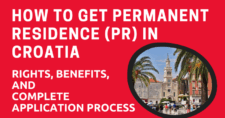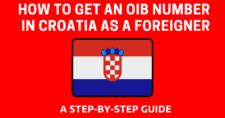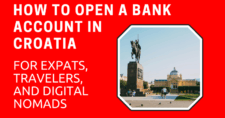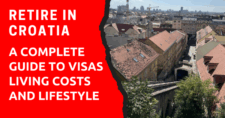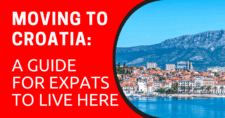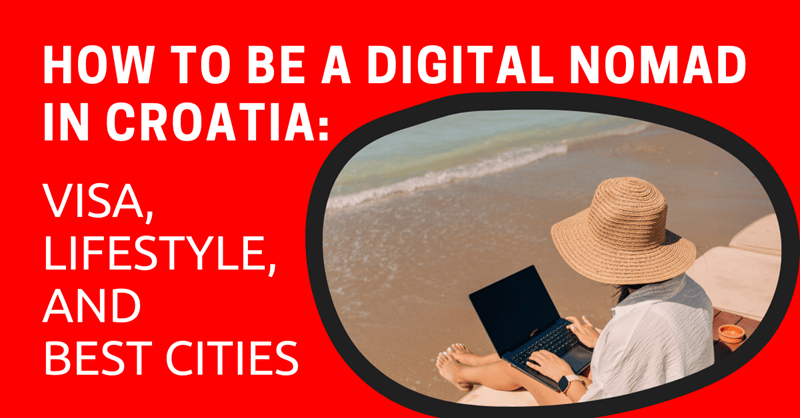
This article will take approximately 44 minutes to read. Don't have the time right now? No worries. Email the ad-free version of the article to yourself and read it later!
Plan your full digital nomad life in Croatia: From visas and living arrangements to cost of living, popular cities, and tips for working online in Europe.
Another European favorite among digital nomads these days has got to be Croatia. Picture perfect cafes, great coffee, and creative spaces abound, plus a visa that makes long stays easy for us online workers. Croatia also boasts stunning scenery, reasonable living costs, and a quality of life comparable to Italy or France. It’s ideal for sea, nature, and history lovers alike. And being part of Europe means one visa lets you work and travel across many countries smoothly. The visa process, costs, and other details are simpler than you might think.
In this article, we’ll dive deeper into why Croatia is becoming a favorite among European digital nomads and what you need to do if you want to join them here. Let’s take a look.
Disclaimer: This article may include links to products or services offered by ExpatDen's partners, which give us commissions when you click on them. Although this may influence how they appear in the text, we only recommend solutions that we would use in your situation. Read more in our Advertising Disclosure.
Contents
- Why Is Croatia Such a Hit With Digital Nomads?
- Visa for Digital Nomads in Croatia
- Cost of Living
- Accommodation
- Traveling within Croatia
- Healthcare and Insurance for Digital Nomads
- Spending and Opening a Bank Account
- Internet and Wi-Fi
- Co-working Spaces in Croatia
- Taxes and Legalities
- Popular Cities for Digital Nomads
- Drawbacks of Being a Digital Nomad in Croatia
- The Digital Nomad Community in Croatia
- Year-round Activities and Festivals in Croatia.
- Language Exchange Activities for Digital Nomads in Croatia
- Adventure Activities for Digital Nomads in Croatia
- Comparing Croatia with Popular European Countries for Digital Nomads
- Is Croatia a Suitable Country for Digital Nomads?
Why Is Croatia Such a Hit With Digital Nomads?
Croatia might not be the first country everyone thinks of, but trust us, there are plenty of reasons why it’s perfect for digital nomads.
- The cost of living isn’t high compared to Western Europe countries like France, Austria, and Switzerland.
- If you come from EU/EEA countries or Switzerland, you can enter and stay without needing a visa.
- Getting around is easy, especially if you’re coming from Europe. A few hours on a plane and you’re there!
- Good quality of life, safe cities, not crowded, with a relaxed beach atmosphere.
- Growth of the Digital Nomads community has brought networking events, meetups, and international conferences.
- Convenient location for travel. Get one visa and you can visit and work in other Schengen zone countries.
- Americans, Canadians, Brits, and Aussies can stay short-term (90 days within 180 days) without needing a visa.
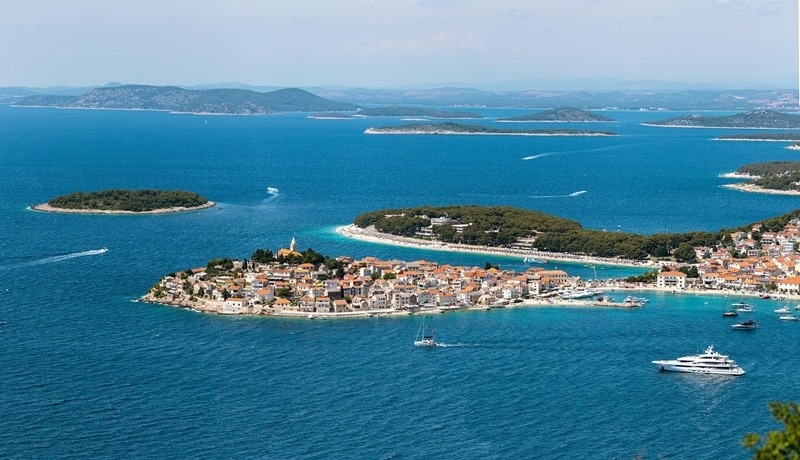
Visa for Digital Nomads in Croatia
First of all, let’s look at visas for digital nomads in Croatia, which are divided into two main groups.
Group 1: If you’re a citizen of the EU/EEA or Switzerland.
Imagine if one day you wanted to change the scenery and work by the seaside in Croatia, listening to the waves while working under the bright sun. How great would that be? And if you’re an EU/EEA and Swiss citizen, it’s easy because not only is it just a few hours away, but you can also travel there immediately without needing a visa or any special permit, making it convenient to travel in and out of Croatia, according to European Union laws on citizen mobility.
But there’s a condition: If staying over 90 days, you must file a Temporary Stay Notification at the local police station near where you’re staying, within 8 days after the initial 3-month period is over. It sounds formal, but really you just need to bring a few documents, like a completed form, your ID or passport, proof of funds, health insurance, and a rental contract, and you’re all set.
Group 2: If you’re from other countries
But if you don’t hold an EU/EEA or Swiss passport, don’t feel left out because they also welcome Digital Nomads with a Temporary Stay Visa. Applying is easy; as long as you’re a freelancer, work remotely, or have your own business and are not employed by or receiving payments from a Croatian company, you can legally work and stay here.
The great thing about this visa is that it allows you to stay for up to 18 months and can be renewed every 6 months. Don’t forget to renew it, though, because if it expires, you’ll have to wait 6 months before applying for a new one again.
You can apply for this visa through the nearest Croatian embassy or consulate. For instance, I’m Thai living in Thailand, which doesn’t have a Croatian embassy, but it does have VFS Global which handles visa applications to Croatia. You can submit your documents here, and they’ll help you process it through the Croatian Embassy in Kuala Lumpur, Malaysia, which is the closest to Thailand and covers the Thai region.
But in 2025, there’s an even simpler way to apply for a Digital Nomad visa because we can apply directly through the website of the Croatian Ministry of the Interior (MUP) by just filling out the form and uploading documents online, including
- the application form
- passport
- photo
- proof of Remote/Freelance work
- financial evidence
- health insurance proof
- accommodation proof
- criminal record certificate
- fee payment receipt
That’s all it takes to start the visa consideration process without needing to waste time traveling to the embassy.
Cost of Living
If you want to live the digital nomad lifestyle in Croatia, the overall expenses are still more wallet-friendly than in famous Western European cities like Paris, Rome, or Milan. Even though prices may rise during certain tourist seasons, choosing to live in local communities or outside the city can save you a lot more.
The key expenses you should prepare for are quite affordable and flexible depending on your lifestyle. Starting with accommodation, this typically depends on the city and type of place. For instance, a small apartment in Zagreb might cost around 400-700 euros per month, while coastal cities like Split or Dubrovnik are pricier at about 600-1,200 euros per month, especially during the tourist season.
Food and drink expenses are another area to plan carefully. Personally, when I was there, I saved money by buying groceries from supermarkets to cook myself and occasionally ate at cafes. This way, my expenses were only about 200-400 euros per month to live comfortably.
For getting around the city, buses are the primary means of transport, costing around 30-50 euros per month. However, if you’re planning to rent a car, your expenses would rise to about 250-500 euros.
However, Digital Nomads might need to factor in other living costs for work such as internet, phone, co-working space, or additional activities, which can be around 100-300 euros per month.
All in all, if you live frugally and plan well, around 1,000-3,000 euros per month should be enough to cover all expenses, which undoubtedly covers the cost of living, which is higher than countries in Asia like Thailand, but Croatia has the advantage of being closer to Europe.
For anyone who wants to plan their expenses more thoroughly, you can read my detailed article on the cost of living in Croatia at “Cost of living in Croatia: How much do you need per month?”
Accommodation
Many people working as Digital Nomads look for a place to stay that’s not just for sleep but also a space where they can live and work combined. In Croatia, there’s a wide variety of accommodation options, from seaside apartments and spacious vacation homes to shared flats in the city center.
Of course, finding accommodation through Airbnb is just as convenient and safe as in other countries, but from my experience living in Croatia throughout 2024, I found that local apps like Njuškalo offer more affordable prices and are often popular with Croatians directly. The point to watch out for is that the app’s language is entirely Croatian, making communication potentially complex for expats.
However, there’s an easier and more suitable channel for Digital Nomads, such as community-based options like the group Facebook Digital Nomads Croatia Housing or specialized websites like Nomad Stay and Digital Nomads Split Listing of shared rooms and affordable condos ideal for those working online, helping you quickly connect with the nomadic community in Croatia.
Traveling within Croatia
Travel within Croatia’s main cities mostly relies on public buses, which cover both the city and its outskirts, except in Zagreb where there’s a ZET Tram service alongside buses, making it easy to reach different areas whether you’re heading to a café, restaurant, or co-working space.
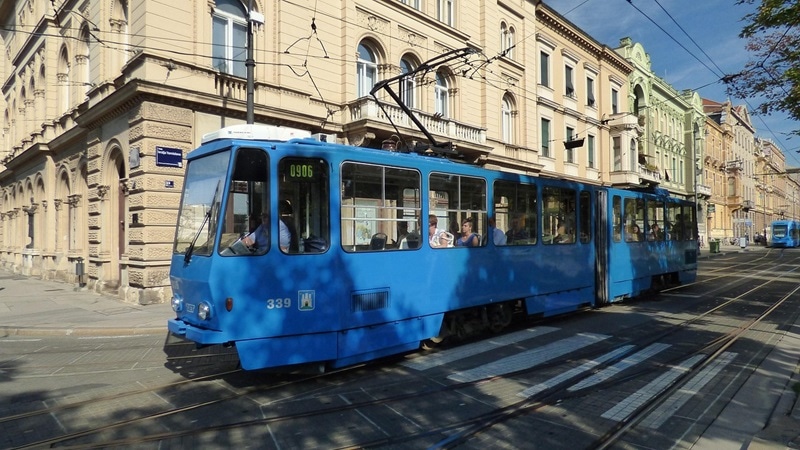
Tickets can be purchased through various channels such as ticket machines, convenience stores, newsstands like Tisak, directly from the driver, or even by tapping credit/debit cards like Visa, MasterCard, including digital cards like Wise or Revolut. It’s cheaper to buy from sales points, with an average cost of about 1-3 euros per trip. For those traveling multiple times a day, there are also daily tickets available for about 4-6 euros.
For intercity travel, such as from Zagreb to Split or Split to Dubrovnik, there are usually intercity bus services from private companies like FlixBus or Arriva. Prices depend on the distance and parking time, averaging between 10-40 euros per trip. But if it’s the summer season when there are more tourists, we recommend booking well in advance.
If you’re planning to rent a car for convenience in Croatia, it’s a great option, especially for those living in distant cities like Zadar, Šibenik, or Pula. It’s perfect for nomads who need flexibility, want to get around easily, visit various co-working spaces, or take short trips during the week while still bringing along some work.
Personally, I rented a neighbor’s car for a month at about 250 euros per month (excluding deposit and insurance). If you want this rate, you can also find rentals on Njuškalo as well, or use more international sites like Sixt, Kayak, Autorentals, which offer a variety of functions.
What you should know is that parking in cities like Split and Dubrovnik is difficult to find, short-term, and expensive. In Split, private parking rentals cost between 3 to 10 Euros per hour. If you park for more than 3 hours, they may offer a daily flat rate, about 30 – 40 Euros per day. But don’t worry, there’s often free parking along the beaches, and if you’re going to a restaurant or café outside the city, most have parking available.
Healthcare and Insurance for Digital Nomads
One of the key documents required for applying for the Croatia Digital Nomad Visa is proof of health insurance or travel insurance with a minimum coverage of 30,000 Euros. This should cover both medical expenses and emergencies, with the policy valid throughout your stay in Croatia and usable in the Schengen Area. Importantly, it must be private or international health insurance; state-mandated insurance is not acceptable. While Croatia’s public healthcare system is quite comprehensive, having private insurance ensures quicker access to services, reduces wait times, and makes it easier to use private hospitals that offer English-speaking services.
For digital nomads, choosing health insurance is crucial because it provides security during emergencies or illnesses abroad. Popular insurance options include SafetyWing and World Nomads. These are travel insurances suitable for nomads as they have packages specifically designed for travelers and long-term workers, plus they offer global coverage. They’re perfect for those who may not be staying in Croatia permanently and want the flexibility to move their workplace around. However, the downside of this type of travel insurance is that it only covers emergency coverage. If cancer or any other serious illness occurs, the insurance might not cover it. Furthermore, in case of long-term treatment, the insurance might send you back home instead.
But if you want higher health coverage, opting for Expat Health Insurance is better as it covers more conditions, including serious illnesses. The downside is that it’s more expensive than travel insurance.
Most insurance covers everything from seeing a GP (General Practitioner), referrals to specialists, diagnostic exams, to emergencies. And for basic symptoms like the flu, stomach ache, or common chronic diseases, you can visit private clinics where doctors often speak English, and some places also allow for online appointment bookings in advance.
As for medicine in Croatia, it’s very convenient. Common household medicines like painkillers, fever reducers, or medications for general chronic conditions can be found at pharmacies in general. In addition, vitamins and supplements are available in cosmetic stores or supermarkets, making daily healthcare not a hassle.
Health insurance case study An American friend of mine stayed around Trogir. He works as a digital nomad in Croatia because he loves activities like diving, road trips, and surfing, which are all quite risky activities. He shared with me an experience that made him greatly appreciate having health insurance.
One day, he had an accident while riding a motorcycle and was severely injured, requiring major surgery. Fortunately, he had purchased travel insurance beforehand and had obtained an international driver’s license and legal diving license, which meant the insurance fully covered medical expenses, surgery costs, and hospital stays. Not only that, but it also covered additional costs such as extra accommodation and new flight tickets since he couldn’t travel as originally planned. This experience clearly showed that health insurance for nomads isn’t something to overlook because accidents and unforeseen events can happen at any time, and the expenses may be much higher than we expected.
Spending and Opening a Bank Account
Croatia is considered a country that supports digital spending well. Most restaurants, cafes, and supermarkets accept payments with Visa and Mastercard cards, including contactless systems that allow you to tap your card or use Apple Pay/Google Pay directly. This makes carrying large amounts of cash unnecessary. Even for small purchases like coffee or pastries, or for taking public transportation, you can conveniently tap and pay with your phone.
For digital nomads who aren’t living in Croatia long-term, using digital card services like Wise or Revolut is very convenient. Both allow you to hold multiple currencies in one account and exchange at rates more transparent than typical commercial banks. Plus, you can withdraw cash from ATMs (fees depend on the package and monthly limit), making everyday life easier without needing to open a local bank account.
However, if you’re planning to stay in Croatia long-term, opening a local bank account is an option that makes life easier. The process can be a bit complex, as you’ll need to handle various documents, starting with a Temporary Residence Permit from the police station, along with your passport and OIB (Osobni identifikacijski broj) tax number. This process can take several weeks to almost a month.
Once you have all the documents, you can apply to open an account at a local bank such as Zagrebačka Banka, Erste Bank. Most places accommodate expats and some have staff who speak English. It might not be as convenient as using digital cards, but for long-term stays, having a local account helps with monthly expenses like accommodation rent or domestic transactions that are often done through Croatia’s internal banking system directly.
But don’t forget, even if you can open a bank account, the law is strict about income as you cannot receive wages directly fromcompanies registered within Croatia. If you hold a Digital Nomad visa and try to bypass the system by having the company deposit into a personal account, the banking system will immediately flag this, potentially leading to legal issues or even revocation of your residency permit.
Internet and Wi-Fi
Another thing I’m really impressed with in Croatia is the public WiFi network that’s free almost everywhere. Whether it’s on a bus, by the water, or even on the beaches, the internet signal is steady and fast, so you don’t have to worry about disruptions. It’s great for nomads who need to work or have meetings online all the time. On average, public WiFi speeds are around 14 mbps, which meets global standards, ranking it as one of the top spots by Wifi Map as the second-best city with public WiFi in the world, just behind Lithuania, which has speeds at 15 mbps, only 1 mbps faster.
From my experience, I often use public WiFi in Croatia, and I have to say it suits the nomadic lifestyle well. When strolling along the pier or visiting the beach, the signal is still strong and stable, functioning just like mobile internet. Sometimes, I try connecting to WiFi on the bus, which depends on each bus. Some have good signals, while others may not have any at all. But this shouldn’t be an issue for nomads who have mobile internet.
However, if you’re looking to work seriously, public WiFi won’t be enough.
According to the latest data from Speedtest Global Index, as of July 2025, Croatia’s average broadband internet speed is 117.01 Mbps for download and 15.33 Mbps for upload, making it a great country for online work.
In most homes, the average speed is around 20-30 Mbps, which is enough for general tasks. However, if a house is equipped with fiber or satellite, speeds can easily jump to 40-50 Mbps. If you feel your connection is still not fast enough, most landlords can have it upgraded for you. Croatian landlords, in particular, are known for being very kind and helpful.
In terms of Co-working Space, the internet is often faster and more stable than at home, making it perfect for real work, whether it’s uploading large files, video conference calls in real-time, or ongoing online work. Generally, the average internet speed in Co-working Spaces is around 40-100 Mbps, depending on the area you choose to use. In major cities like Zagreb, which is a hub for nomads from many countries, there are usually modern Co-working Spaces with full facilities and excellent support for high-speed internet. But if you’re in a secondary city like Zadar, you might need to spend a little time selecting, as there may not be many options with strong and stable internet.
What made me both laugh and shocked at the same time was the Wi-Fi password here… it’s truly extraordinary. Many rental homes have the longest and most complex codes I’ve ever encountered in my life. For instance, the house I’m staying at has a password that is 23 characters long! It’s even longer than a national ID number. Importantly, it’s filled with strange symbols like #j14i9d18e%1idmd10&9)s which nobody could possibly remember. In the end, I had to take a photo of it on my phone to type in every time I switch devices.
Even though there are funny moments with passwords like this, it’s part of the charm of living in Croatia. At least you can be assured that wherever you are, the internet is always ready for use.
Internet Quality
- In big cities like Split, Dubrovnik, and Zagreb, home and mobile internet is fast and quite stable, suitable for Zoom, Google Meet, or working with large files.
- Disconnects or slowness might occur during rush hours, but not frequently.
- In some areas, like homes near Split airport, you might experience phone signal loss during takeoffs and landings, and while home Wi-Fi is usable, the speed might drop from normal.
- In small villages or remote areas, connections can be slower, and some places may rely mainly on mobile internet.
- On islands, signal comes with the wind. On stormy days, you may not be able to use the internet at all.
SIM Cards and Mobile Packages
Croatia has three main providers: Hrvatski Telekom (T-Mobile), A1, and Telemach All networks support 4G/5G in major cities and can be purchased at convenience stores or network branch outlets scattered throughout every city.
Sample packages for tourists or online workers
- Hrvatski Telekom (T-Mobile) offers a prepaid SIM card called Simpa, which is popular among tourists and nomads. You can top up and choose your package via SMS or the My T-Mobile app. Weekly rates are about 10 GB for approximately 8 EUR, and monthly packages are 20 GB for about 13 EUR. It’s perfect for those who need stability and easy access.
- A1 Croatia has a prepaid SIM card called Start Paket, which typically comes with an initial balance and data. It offers unlimited data weekly packages for around 12 EUR, or a 20 GB package for about 10 EUR, which can be used until it runs out.
- Telemach stands out for its affordability and generous data offerings. Popular packages include the Tourist SIM: unlimited internet for 10 days at just 10 EUR, and unlimited internet for 30 days for about 20 EUR. It’s a favorite among Digital Nomads who need heavy internet usage.
Co-working Spaces in Croatia
Recently, Croatia has seen an increase in co-working spaces to accommodate the influx of tourists and nomads working in the country. Popular cities like Zagreb, Split, Dubrovnik, and Zadar are filled with beautiful cafes and shared offices designed for online workers. Besides expat digital nomads, Croatians themselves are increasingly using these services as hybrid work becomes more common in Croatia. Some places are open 24/7 to cater to people working across time zones, such as Americans or Canadians working on their home time. Some locations even offer co-working + co-living, combining accommodation and workspaces, perfect for those looking to be part of a community.
For example, co-working spaces that I found through Coworker. Some places are cafes where you can sit for free just by purchasing food and drinks, while others rent out desks starting at about EUR 150-300 per month, such as
- Smartspace (Split) – a co-working space in the heart of Old Town blending work with art and creative community.
- Regus HOTO Savska (Zagreb) – A global co-working network with professional standards and convenient access.
- Life According to KAWA (Dubrovnik) – Work with views of the old town and sea, featuring a cafe and craft shop.
- COIN Zadar (Zadar) – Over 370 sq.m. of space with full services and a strong local community.
- Hvar Digital Nomads Coliving (Hvar Island) – Combines accommodation and co-working on a beautiful island with St. Tropez-style sea views.
Overall, co-working in Croatia is quite appealing because it offers more than just Wi-Fi and a desk. There’s community, atmosphere, and a full lifestyle, making it perfect for those looking to work amidst culture, historic towns, and the Mediterranean Sea. Croatia is definitely the right answer.
Taxes and Legalities
Croatia is considered quite friendly to Digital Nomads. Those holding a Digital Nomad Visa are exempt from income tax in Croatia, provided all your income is sourced from outside the country, whether from companies or clients abroad. This means you can work online from Croatia without worrying about being considered a “tax resident” even if you stay for more than 183 days.
It’s important to note that the Digital Nomad Visa doesn’t allow you to work for companies in Croatia and doesn’t cover passive income like interest, dividends, or real estate rent, which may be taxable separately in the country.
Popular Cities for Digital Nomads
Let’s take a look at some of the cities digital nomads love to stay in Croatia.
Split, a Favorite City Among Nomads
If I were to recommend a city, I would first suggest Split because I lived here for almost a year. Every morning, I woke up to bright weather and later in the morning, I would take a stroll around Diocletian Palace before heading back to my favorite café to work. D16 This café is like a meeting spot for nomads from around the world. If you’re looking for inspiration or meeting new colleagues, this is the place.
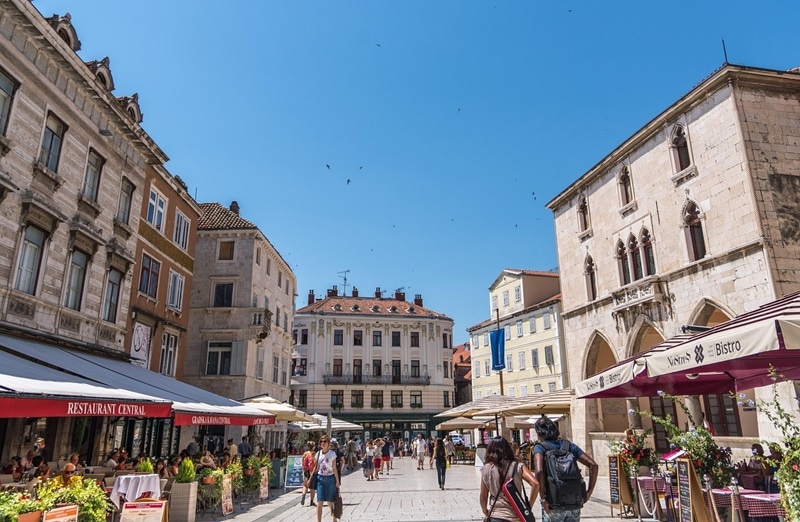
In Split, there are three main neighborhoods popular with Digital Nomads: the city center and Old Town Split, Old Town Trogir, and Kastela. Generally, accommodation prices in the Old Town area are higher than other neighborhoods because it’s a major tourist spot, close to the sea, and conveniently accessible to cafés, restaurants, or co-working spaces.
Like my American friend, he stayed here as a nomad in the summer, renting accommodation in Old Town Trogir for 3,000 euros per month. Although the place had a workspace, the building was quite old, causing the Wi-Fi to work sometimes and sometimes not. But it was conveniently located, surrounded by restaurants.
From personal experience, I often recommend to friends that if you want value and comfort, choosing to stay in the Kastela area, such as Kastela Novi, Kastela Sucurac, Kastela Gomilica, is more suitable. It’s not far from the city of Split. Most room prices start from 450 – 1,000 euros. There’s also a bus stop nearby, making it easy to travel into both Trogir and Split city. Additionally, supermarkets and shops are spread throughout the villages. If you want to save money, you can also find a shared room with other nomads starting at about 250 euros per month.
Things to know before choosing a room in Split
- Fast and stable wifi – this city is known for having one of the fastest internet speeds in Croatia. No need to worry about Zoom freezing mid-meeting.
- Try to choose a newly renovated or fully furnished room because staying long-term will be much more comfortable.
- If you don’t have a car, rooms close to the city are the most convenient because Split is highly walkable, close to cafes, restaurants, and co-working spaces.
Dubrovnik: The City of Stone Walls and the Game of Thrones Series
Many people know Dubrovnik from the ‘King’s Landing’ scenes in Game of Thrones. It’s a seaside city surrounded by ancient stone walls, making it a destination that both tourists and digital nomads fall in love with.
I once took a short trip during spring. It felt like living in a breathing historic city, with cafes and restaurants scattered along the small alleys. A leisurely stroll would lead me to several small co-working spaces. The city is quite compact, making life easy with everything being within walking distance and supermarkets dotted around.
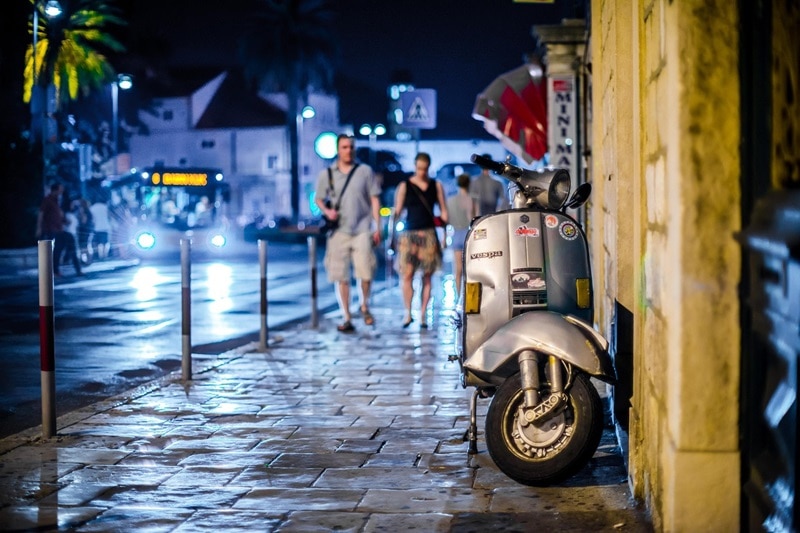
In the summer, tourists crowd the city and it gets lively, but come winter, the city is peaceful and perfect for working and living a chill life.
However, accommodation in Dubrovnik can be quite expensive. If you choose an older apartment in the city center, prices usually rangebetween 1,000 – 5,000 Euros per month. But if you’re willing to move a bit further out, the prices can drop to 800 – 1,300 Euros per month, depending on the location and condition of the accommodation.
Things to know before choosing a room in Dubrovnik
- The cost of living is higher than in other cities, especially in the Old Town where studio rents start around 800 – 1,000 Euros per month. But if you head out to the suburbs, it can be almost half the price.
- The internet is stable, but older apartments may still have outdated wiring, so it’s always good to check with the landlord first.
- If you’re a creative type, this city is a hub of great ideas, packed with art and history surrounded by inspiration.
Zagreb, a Vibrant and Modern Capital City
This city might not be by the sea, but it’s perfect for those who love big cities. It’s got everything from transportation systems, cafes, co-working spaces, and a variety of activities. Plus, it’s full of international conferences that help make connections in IT, law, and business fields, such as International Conference on Numerical analysis (ICNA) or Identity Crisis Network: International Conference to name a few.
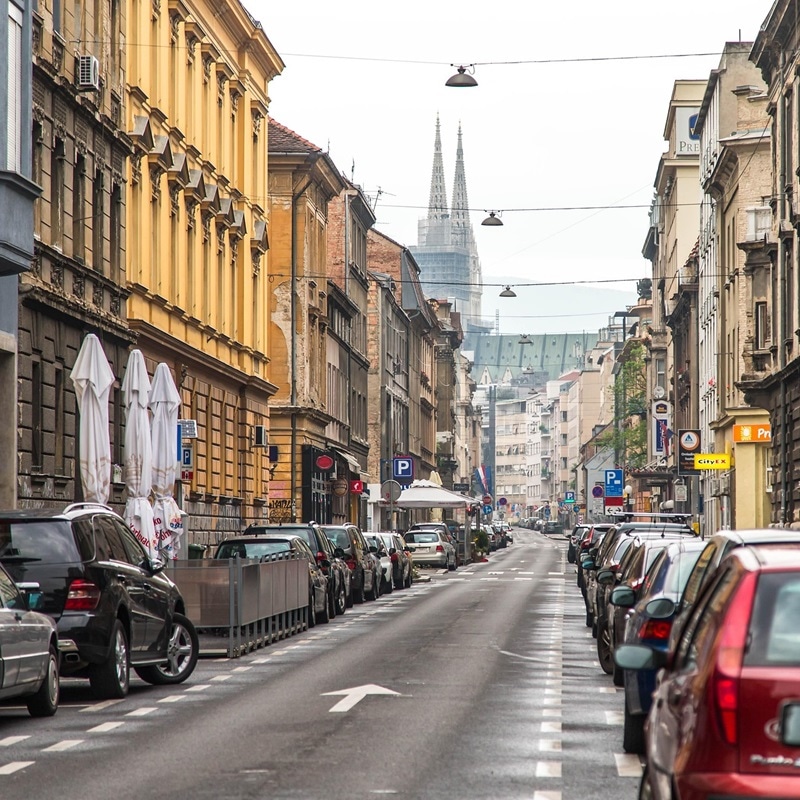
When I visited during the winter, the atmosphere felt like Central Europe mixed with Croatian warmth. With outdoor markets, chic cafes, and reasonably priced apartments, life was easier than in Split or Dubrovnik, plus the cost of living is lower. Accommodation isn’t expensive; a city-center apartment costs about €500 – €800, or if you opt for a shared room like my friend, it’s only around €250 – €500.
Things to know before choosing a room in Zagreb
- The cost of living is cheaper than in seaside cities. A one-bedroom apartment in the city center starts from around €500 – €600 per month.
- Public transport is excellent, with trams and buses throughout the city. You can live comfortably without a car.
- Lots of activities, including music, art, and food festivals, so you’ll never feel lonely even for a long stay.
Zadar: A Small, Charming Seaside Town
If you enjoy quiet, uncrowded seaside towns unlike Split, I highly recommend Zadar. This town is famous for the Sea Organ and Greeting to the Sun, seaside art that plays with light and wave sounds. It’s a favorite spot for many nomads who want to work or find peace, and it’s a small, modern town that rivals others.
A friend of mine lived here for 3 months and said it felt like a retreat from the hustle and bustle of big cities. You can rent a beautiful seaside room for just 500 euros a month, with a view and atmosphere that exceed the price. If you want a whole house with a garden for working, the price ranges from 1,000 to 3,000 euros a month depending on amenities and location, which is perfect forthose looking to retire here.
The drawback of Zadar is that it’s not a big city, so facilities like restaurants or co-working-style cafes are limited compared to Split or Dubrovnik, and sometimes you might need to drive to nearby towns instead.
Another thing is traveling out of town. If you want to fly to another country or use public transport to other cities, you may need to plan ahead because Zadar’s airport and train station have less frequent flights and trains compared to Split. Or if you want to go shopping or visit nearby big cities, sometimes a drive of about 30-60 minutes is necessary.
Thus, Zadar is perfect for those who love peace, the seaside, and a less crowded atmosphere. However, if you want maximum convenience or activities for digital nomads, you might need to adapt or plan more.
Things to know before choosing accommodation in Zadar
- Internet is good, but the signal can be weak in some remote areas.
- Cost of living is reasonable, especially fresh seafood at affordable prices.
- Small town, easy to walk, simple life, suitable for those who want to focus on long-term work or projects.
Drawbacks of Being a Digital Nomad in Croatia
- Internet in some areas is still not as stable as in Western Europe, especially in some coastal towns and rural areas. Mobile signal on islands or in rural towns is even less reliable. In some areas, signals only come with the wind.
- Accommodation costs soar during the tourist season, especially in the coastal cities of Split and Dubrovnik, which are major tourist hubs attracting lots of visitors. It might be hard to find a place to stay between June and September.
- Traveling between major cities is time-consuming and costly since each city is about 3-4 hours apart. Even though big cities like Split, Dubrovnik, and Zagreb have airports, ticket prices can be high and there aren’t many intercity flights.
- Some cities are quiet during off-season, and services, restaurants, cafes, and entertainment may be limited during the low season.
- The Digital Nomad visa doesn’t offer a route to permanent residency. If you’re looking to move for a permanent residency visa, this might not be the right fit.
- The winter can be quite cold and windy, sometimes making it difficult to work outdoors.
The Digital Nomad Community in Croatia
Croatia hosts diverse communities for nomads working in the country, offering co-working spaces, co-living, and online communities connecting nomads from all over the city. If you join Facebook groups or Meetup, you’ll find plenty of activities to keep you from getting lonely as a nomad here. Whether it’s fun activities or relaxing stress-relievers, or self-development workshops, for example. Test-driven development LIVE CODING In Zagreb, Segel-Retreat in Kroatien.
In Split, Confident Connections In Dubrovnik, and Flutter Zürich Hybrid Meetup in Zadar and also find great activities like this in various communities such as:
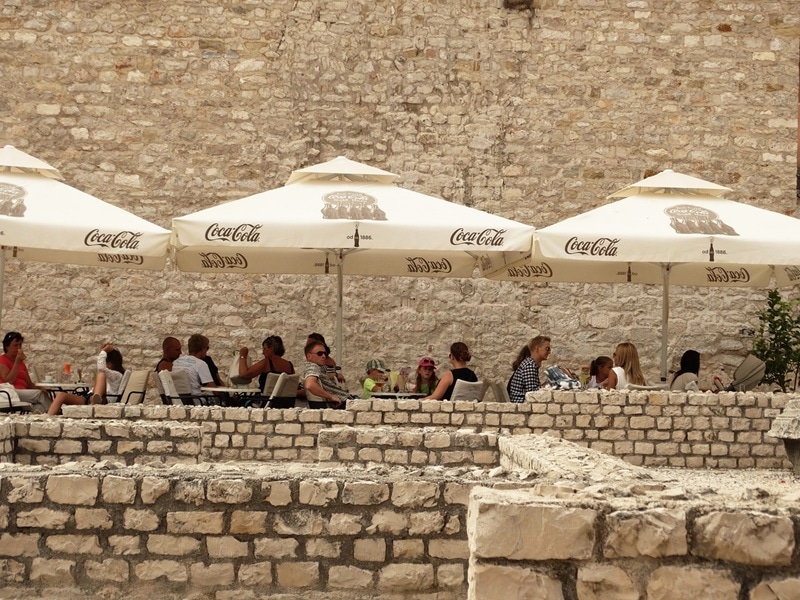
- Digital Nomads Croatia (Facebook Groups): The main community for Digital Nomads in Croatia, a hub of information for online workers, expats, and locals interested in joining, sharing experiences, and tips about life and work in Croatia, including activities and meet-ups across the country.
- Digital Nomads Split Croatia (Facebook Groups): A group for online workers living in or visiting Split, offering opportunities to exchange information about living, work, and services related to Digital Nomads in this coastal city.
- Digital Nomads Croatia Housing (Facebook Groups): A resource for finding accommodation information for online workers in Croatia, covering medium-long term rentals, room sharing/coliving, and accommodation inquiries. This community is independent and not tied to any organization.
- Digital Nomads Dubrovnik Croatia (Facebook Groups): A group for online workers living in or visiting Dubrovnik. This community also serves as a networking space for those interested in joining the Dubrovnik Digital Nomads Conference and other activities, promoting Dubrovnik as a city ideal for Digital Nomads living and working.
- Nomads in Croatia (Whatsapp): For Digital Nomads living in or visiting Croatia, this is a real-time communication channel to quickly share information, news, activities, and assistance among members.
- International Meetup│Nomad Tribe Croatia (Meetup): A group for English speakers in Zagreb, whether from the US, UK, Canada, France, Spain, Austria, Germany, the Netherlands, Australia, New Zealand, or Croatians with connections to the expat community. It’s a space to meet, network, and join in fun activities.
- Digital Nomads Association Croatia (DNA Croatia): This non-profit organization promotes Croatia as a destination for Digital Nomads and provides information on visas.
- Saltwater Nomads: This group offers both coworking spaces and accommodation for Digital Nomads in Split, Croatia. The community provides opportunities to meet, exchange experiences, and engage in networking activities.
Year-round Activities and Festivals in Croatia.
Besides activities organized by small communities, Croatia offers world-class events and festivals to keep Digital Nomads’ lives exciting. Whether it’s tech events, creative gatherings, music shows, or traditional cultural festivals, every activity is ready to let you enjoy life and build connections as a Digital Nomad through long-standing great events, including
Plitvice Digital Nomads Week
The annual event organized by DNA Croatia in 2024 at the Plitvice Lakes National Park, a famous park with beautiful waterfalls. The event is designed to let nomads blend work with nature. Participants can work remotely while enjoying the park’s views. The event features workshops, networking opportunities, and guided tours at Camping Plitvice.
However, for 2025, there’s no official information or announcement about the continuation of Plitvice Digital Nomads Week, so it’s unclear if the event will continue. You can follow updates from the organizers at DNA Croatia.
The Olive Picking World Championship
a fun event held since 2017 and continuing through to 2025. The event, The Olive Picking World Championship, Held every October in Postira on Brač Island, Croatia, where Digital Nomads teams compete with others to harvest the most olives within a set time. Besides the competition, there’s olive oil tasting, learning about olive cultivation, island exploration trips, and local evening activities, giving everyone a unique and fun experience.
It fosters friendships among participants from various countries. It’s not just a competition but also connects olive farming traditions with tourism and has won awards like “Best Creative Experience” from the Creative Tourism Network, allowing participants to enjoy, relax, and learn about local culture all at once.
Dubrovnik Digital Nomads Conference
Dubrovnik Digital Nomads Conference promotes Dubrovnik as a digital nomad hub. It has been held since 2020 and attracts over 150 participants from around the world each year. The focus is on skill exchange, networking, and discussions about remote work strategies and sustainable tourism, which help enhance infrastructure and policies supporting the nomad community.
In 2025, the event is expected to continue, though no official details have been announced yet, but it’s a key ongoing event for the digital nomad community in Croatia.
Zagreb Digital Nomads Week
Zagreb Digital Nomads Week is an event held in Zagreb since 2021, focusing on key topics for the nomad community like online safety, building a digital identity, and finding new opportunities. This event serves as a platform for nomads from around the globe to exchange knowledge, network, and build professional connections, with workshops and knowledge-enhancing activities helping attendees adapt and thrive in the digital world. Although there is no official announcement for 2025, the event is expected to continue.
Dubrovnik Digital Nomads-in-Residence
Dubrovnik Digital Nomads-in-Residence is a program started in 2021, organized in collaboration with Saltwater Nomads, the Dubrovnik Tourist Board, and Total Croatia News. This program offers selected Digital Nomads the opportunity to stay in Dubrovnik for 4 weeks to exchange knowledge, give advice, and participate in planning strategies to develop the city to be more nomad-friendly, with workshops and creative design thinking activities.
Although it’s unfortunate that this event will not continue in 2025, there are still many great activities for nomads to participate in.
Language Exchange Activities for Digital Nomads in Croatia
For those who want to practice languages and learn the local culture, attending major events like Zagreb Digital Nomads Week to meet people from around the world is a great start. You’ll find plenty of nomads eager for language exchange.
You can also use online platforms like MyLanguageExchange.com to find a partner to practice Croatian, whether it’s in-person meetings, emailing, texting, or voice chatting, along with guidance and learning plans to make the process fun and effective. Additionally, there are face-to-face meetups and language exchanges like BlaBla Language Exchange which are regularly held in cities such as Zagreb, Split, and Dubrovnik.
Another must-do activity for anyone in Zagreb is Language Conversation Table, held every Sunday at 7:00 PM at Domenico Café, located at Preradovićeva 33/3 near Trg Petra Svačića. They have a special room for participants to practice Croatian and other languages with native speakers for 3 hours free of charge. Just order a drink to support the café. This event is perfect for those serious about language practice while enjoying the café atmosphere in Zagreb and meeting new friends from around the world.
For those interested in languages other than Croatian, there’s also Read & Learn Italian: Il Giro d’Italia, an online activity for those who want to practice intermediate Italian. Participants will read about the Il Giro d’Italia cycling race in small groups, translate into English, and return to the main room for discussions to share ideas and opinions. This is organized via Zoom, making it convenient for Digital Nomads to practice languages online from any city.
Adventure Activities for Digital Nomads in Croatia
For adventure lovers, Croatia offers options that rival any other country. From yoga, surfing, and rock climbing to daring adventure trips, it’s perfect for those looking to recharge both body and mind while embracing the beautiful, abundant nature, including:
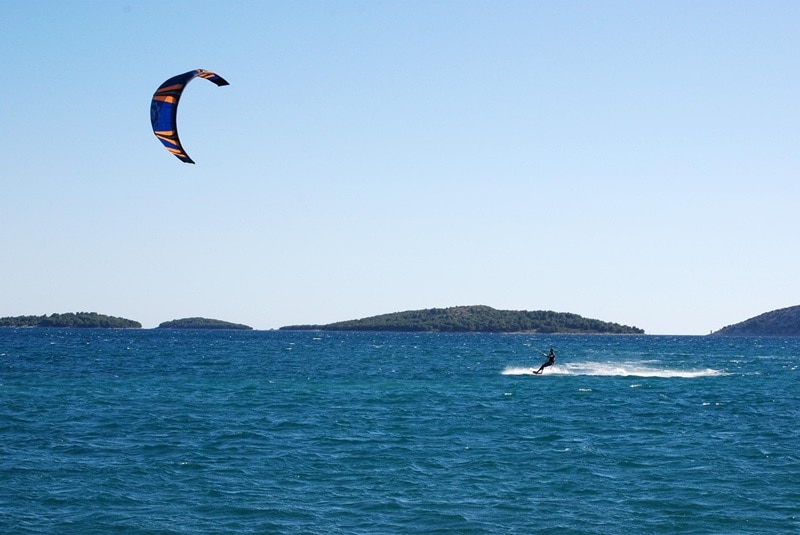
- Climbing Kilimanjaro Group – Summer 2025: A Kilimanjaro climbing trip for those seeking a grand adventure. This activity focuses on preparation, training, and choosing the right gear, with the chance to exchange ideas with fellow travelers. It takes place every September.
- Wellness Thursday: Yoga and Meditation Workshop: Yoga activity every Thursday for those wanting to recharge body and mind. Start with yoga to stretch muscles and relieve tension, followed by meditation focusing on mindful breathing. Suitable for all levels, no experience needed to join.
- Hiking, Rafting, Waterfalls in Bosnia + Dubrovnik Medieval Town – Long Weekend: A long weekend trip featuring hiking, rafting, a visit to Kravice Waterfalls, and the old town of Dubrovnik, a UNESCO coastal heritage site. Perfect for those who enjoy adventure and action-packed travel in a mix of natural and historical settings.
- Gutsy Girls | Croatia SUP Adventure – Paddleboarding Holiday for All Levels: 6-day all-women SUP trip in the Zadar Archipelago, paddle between beautiful islands, improve SUP skills with expert coaches, hike, bike, and experience local culture and cuisine. Suitable for beginners and intermediate levels.
Comparing Croatia with Popular European Countries for Digital Nomads
When it comes to other popular European cities for expat nomads, choices often include Portugal, Spain, Estonia, and Georgia, which are relatively close.
Choosing a European country for Digital Nomad life really depends on personal preferences, budget, climate, and the type of community you want to engage with. Let’s see how Croatia compares with countries like Portugal, Spain, Estonia, and Georgia.
Portugal
A Western European country that supports a large Digital Nomad community. Major cities like Lisbon and Porto have co-working spaces with internet speeds up to 120 Mbps and facilities that accommodate online workers, providing a high quality of life. However, rural areas may have limited internet access, making it more suitable for living in big cities. They also offer the D8 visa, allowing nomads to work for 1-2 years, which is about the same duration as Croatia.
The cost of living here is considered high. Comparing the cost of living via Numbeo, Lisbon’s cost of living is almost double that of Zagreb, especially with rent being 92% higher. But the advantage is a large and friendly nomad community that makes connecting with others easy. Even though accommodations and co-working spaces might fill up quickly, it’s worth it for networking.
Portuguese is primarily used here, but English is quite widespread in major cities and communities, making communication convenient and living easy, not unlike Croatia.
Portugal also offers a big advantage for those who love to travel. It’s well connected to the rest of Europe, making weekend getaways or regional trips simple and affordable. For example, you can look at this epic 3-week Spain and Portugal itinerary to see how easy it is to explore both countries in one journey.
Spain
A country with modern infrastructure like the internet and transportation systems, ensuring a good quality of life, ideal for online workers. Main cities like Barcelona, Madrid, and coastal cities like Valencia have large and friendly Digital Nomad communities with plenty of Co-working Spaces, Co-working Hubs, and Co-living Spaces, making it easy to network and join activities.
There is also a Digital Nomad Visa allowing a stay of up to 1 year, extendable up to 5 years, which is longer than other European countries. However, the cost of living here is considered high, especially rent and food, compared to Croatia. For instance, Split shows the overall cost of living is about 11% higher. But Spain has all the amenities you need and primarily uses English in nomad communities and major cities, making communication smooth and life much easier.
Estonia
A country with advanced digital systems and one of the pioneers of the Digital Nomad Visa, making daily life very convenient for nomads. Everything can be handled online, from paperwork to financial transactions. In the capital, Tallinn, there’s a large Digital Nomad community, especially in the Kalamaja area, full of co-working spaces and networking events. However, the long winters compared to other countries might limit lifestyle aspects during this season.
However, you can only apply for this type of visa for up to 12 months, which is less than Croatia. The cost of living is slightly higher than in Croatia, especially for restaurants and groceries, but rent is similar to cities like Split and Dubrovnik. The advantage is that the community here speaks English well, even though the official language is Estonian, making communication and daily life easy. It’s perfect for nomads who love living a fully online life in a tech-advanced country.
Georgia
In this country with the lowest cost of living in the region, nomads can live quite economically, especially in the capital city, Tbilisi. The total expenses including accommodation and food are almost half of Croatia, and it’s easy to enter the country. Many nationalities can stay for up to 1 year without a visa, and it’s also possible to apply for a Digital Nomad visa for up to 1 year as well.
Although it’s easy, the Digital Nomads community in Georgia is not very extensive. It might not be ideal for nomads seeking cultural exchange activities or knowledge sharing. However, Tbilisi has several co-working spaces and cafes with Wi-Fi to choose from. Popular areas include Vake, Vera, Sololaki, and Saburtalo.
Even though the internet system and some infrastructure are not as stable as Croatia, they are sufficient for online work. Communication might mainly need to be through translation apps because people predominantly use the Georgian language, especially in remote cities. However, in large cities and among the younger generation, there are some who can speak good English.
Is Croatia a Suitable Country for Digital Nomads?
Croatia has become one of the top destinations for Digital Nomads due to several strengths, including a reasonable cost of living compared to Western Europe, high quality of life, safe and uncrowded cities, and a convenient location. This makes it easy to travel to work and explore other European countries. There are many cities in Croatia perfect for nomad life, such as Split, a bustling seaside city; Dubrovnik, a historic and inspiring city; and Zagreb, the modern capital with comprehensive transport systems, activities, and co-working spaces. Then there’s Zadar, a small, peaceful seaside town ideal for nomads who need quiet and focus for their work.
Croatia also accommodates Digital Nomads in terms of daily living, offering extensive Wi-Fi coverage, easy access to healthcare, digital financial services, and a variety of accommodation options, including beachfront apartments, shared rooms, and long-term suitable homes.
Considerations for those deciding: Croatia is perfect for people who want to blend work and lifestyle, enjoy seaside towns or large cities that are safe and comfortable, and connect with Digital Nomad communities. However, you should plan accommodation, travel, and health insurance in advance to make your nomadic life smooth and enjoyable.
If you want to become digital nomads here, read another article about how to move to Croatia and what you need to prepare.



